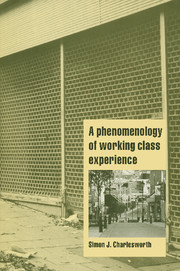Book contents
- Frontmatter
- Contents
- Acknowledgements
- 1 Introduction: Dead Man's Town
- 2 Rotherham: history, demography and place
- 3 Class and the objectifying subject: a reflexive sociology of class experience
- 4 A landscape with figures?
- 5 Understanding the barriers to articulation
- 6 Necessity and being working class
- 7 The culture of necessity and working class speech
- 8 Conclusion
- Notes
- References
- Index
5 - Understanding the barriers to articulation
Published online by Cambridge University Press: 22 September 2009
- Frontmatter
- Contents
- Acknowledgements
- 1 Introduction: Dead Man's Town
- 2 Rotherham: history, demography and place
- 3 Class and the objectifying subject: a reflexive sociology of class experience
- 4 A landscape with figures?
- 5 Understanding the barriers to articulation
- 6 Necessity and being working class
- 7 The culture of necessity and working class speech
- 8 Conclusion
- Notes
- References
- Index
Summary
“elp yerselves!' he said. “elp yerselves! Dunna wait f'r axin!'
He cut the bread, then sat motionless. Hilda felt, as Connie once used to, his power of silence and distance … ‘Still!’ she said, as she took a little cheese. ‘It would be more natural if you spoke to us in normal English, not in vernacular.’
He looked at her, feeling her devil of a will.
‘Would it?’ he said, in the normal English. ‘Would it? Would anything that was said between you and me be quite natural, unless you said you wished me to hell before your sister ever saw me again: and unless I said something almost as unpleasant back again? Would anything else be natural?’
‘Oh yes!’ said Hilda. ‘Just good manners would be quite natural.’
‘Second nature, so to speak!’ he said: then he began to laugh. ‘Nay’, he said. ‘I'm weary o’ manners. Let me be!’
(Lawrence 1994a: 243-4)We have now looked, in some detail, at the relation of working class people to their environment. Through my elaboration of a set of insights concerning their being-in-the-world I have already tried to cast light on things that one needs to be sensitive to in the treatment of the talk of working class people. If we understand the way utterance and articulation emerge from being-in-the-world - from comportment and engagement – then we stand a chance of recognizing the significance that working class speech articulates.
- Type
- Chapter
- Information
- A Phenomenology of Working-Class Experience , pp. 131 - 149Publisher: Cambridge University PressPrint publication year: 1999



